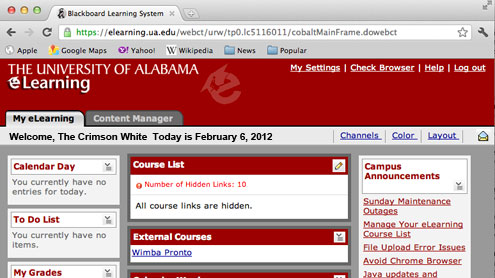 The University of Alabama will switch its online learning-management system from eLearning to Blackboard Learn throughout the 2012 school year, with the transition set to begin this summer.
The University of Alabama will switch its online learning-management system from eLearning to Blackboard Learn throughout the 2012 school year, with the transition set to begin this summer.
The company that provides technical support and updates for eLearning will no longer support it after Dec. 31, 2012. UA has used the eLearning system since 2007.
“[eLearning] is out of date and clunky compared to many of the more modern applications in use today,” said Marilyn Staffo, director of the Faculty Resource Center at the University. “For example, the eLearning system does not work well with modern browsers such as [Google] Chrome.”
Staffo said there has been a 45-percent increase in the use of eLearning across campus in the past three years. She said she was unsure, with the continued growth of the University, that eLearning would be able to support the school’s needs in the future.
eLearning is used across campus by professors and students to view grades, homework assignments and to take tests. Blackboard Learn offers the same features, including the ability to access lecture materials and communicate through mail messages.
“The two programs both offer capabilities that faculty and students need, but the new system offers a lot more flexibility and has a more up-to-date interface,” said Dr. Rachel Shuttlesworth Thompson, the University’s director of emerging technologies and research.
The new Blackboard Learn will also give students and faculty the opportunity to download apps for their iOS, Android or Blackberry devices. Professors will also have the option of sending text message updates and reminders to their students via Blackboard Learn.
There are many large universities across the country already using Blackboard, and Thompson hopes that this means there is a valid interest in keeping the program for an extended time period.
The transition has begun this semester with a small pilot program of eight course sections and will be implemented with 50 percent of the course sections offered in Blackboard Learn this summer. 75 percent of courses will be offered this fall, and all courses will be taught in Blackboard Learn by 2013.
“The transition will require a period of adjustment for students, faculty and the support staff on campus,” Thompsons said, “but there will be many opportunities to get assistance.”
There will be a training course available to students on how to use Blackboard Learn. Professors will be invited to several training workshops and be able to access online videos, tutorials and other resources. The next information session is scheduled for Feb. 14 from 1 to 2 p.m. in Gorgas Room 205.









